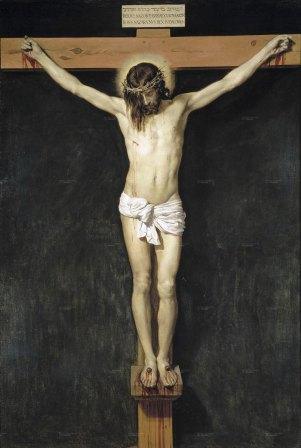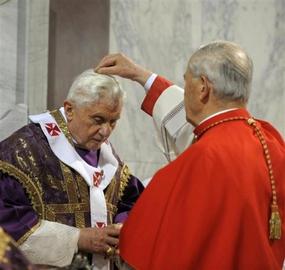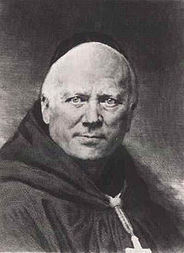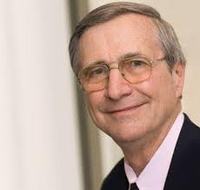 A week ago (February 18, 2012) Dr. Peter J. Kreeft, professor of Philosophy of Boston College and popular Catholic apologist delivered two lectures concerning the conflicts of culture, conscience, freedom and faith in which we find ourselves at these days.
A week ago (February 18, 2012) Dr. Peter J. Kreeft, professor of Philosophy of Boston College and popular Catholic apologist delivered two lectures concerning the conflicts of culture, conscience, freedom and faith in which we find ourselves at these days.
Indulgence granted on Friday in Lent….
A plenary indulgence is granted to the Christian faithful who:
on any Friday in the season of Lent piously recite the prayer before an image of the Crucified Jesus Christ after communion; …
Behold, O good and most sweet Jesus, I fall upon my knees before Thee, and with most fervent desire beg and beseech Thee that Thou wouldst impress upon my heart a lively sense of faith, hope and charity, true repentance for my sins, and a firm resolve to make amends. And with deep affection and grief, I reflect upon Thy five wounds, having before my eyes that which Thy prophet David spoke about Thee, o good Jesus: “They have pierced my hands and feet, they have counted all my bones.”
Lent 2012: we, prodigal children, can return
Pope Benedict XVI processed from the Benedictine Church of Saint Anselm to the Dominican Church of Saint Sabina on the Aventine Hill. A long standing tradition of the popes, though it was in abeyance for several years until 1979 when John Paul II revived the tradition. The Benedictine monks welcome the Pope and his entourage for a moment of prayer and reflective before processing to the 5th century church of the Dominican Friars where Holy Mass is celebrated with the distribution of ashes. As usual, Cardinal Tomko, the cardinal titular of Saint Sabina’s gave Benedict his ashes. The following homily of the Pope’s focusses on the origins of this humble sign that assists in our recognition of salvation. Is this our recognition, too?
Ash Wednesday is a day of fasting and penance on which we begin a new journey towards the Easter of Resurrection, the journey of Lent. I would like to reflect on the liturgical sign of the ashes, a material sign, a natural element that, in the Liturgy, becomes a sacred symbol, so important on this day that marks the start of our Lenten journey. In ancient times, in the Jewish culture, it was common to sprinkle one’s head with ashes as a sign of penance, and to dress in sack-cloth and rags. For us Christians, there is this one moment which has important symbolic and spiritual relevance.
Ashes are the material sign that brings the cosmos into the Liturgy. The most important signs are those of the Sacraments: water, oil, bread and wine, which become true sacramental elements through which we communicate the Grace of Christ who comes among us. The ashes are not a sacramental sign, but they are linked with prayer and the sanctification of the Christian people. Before the ashes are placed on our heads, they are blessed according to two possible formulae: in the first they are called “austere symbols”, in the second, we invoke a blessing directly upon them, referring to the text in the Book of Genesis which can also accompany the imposition of the ashes: “Remember that you are dust and unto dust you shall return”.
Continue reading Lent 2012: we, prodigal children, can return
Communion and Liberation opens cause for beatification and canonization for Luigi Giussani today
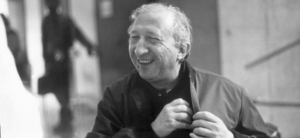 Father Julián Carrón, the President of the Fraternity of Communion and Liberation, the ecclesial movement founded Father Luigi Giussani (who died 7 years ago today) and which was approved by the Church 30 years this past February 11, gave the preliminary research to Angelo Cardinal Scola, Archbishop of Milan, to open the diocesan phase of investigating the eventual beatification and canonization of Father Luigi Giussani.
Father Julián Carrón, the President of the Fraternity of Communion and Liberation, the ecclesial movement founded Father Luigi Giussani (who died 7 years ago today) and which was approved by the Church 30 years this past February 11, gave the preliminary research to Angelo Cardinal Scola, Archbishop of Milan, to open the diocesan phase of investigating the eventual beatification and canonization of Father Luigi Giussani.
Lent: When fallen humanity humbles himself before divine justice
Lent needs some explanation. The liturgical season is so vast and complex one needs to enter into this period of preparation for Easter with eyes wide open. It is a time for our conversion. The famous 19th century Benedictine monk Dom Prosper Guéranger (founder and Abbot of the Abbey of Solesmes 1837-1875) wrote brilliantly of the our Christian life of prayer in a multi-volume collection that is unfinished, The Liturgical Year. While Guéranger’s images are typical of the 19th century, they remain crucial, I contend.
Here is his piece on Lent:
Yesterday, the world was busy in its pleasures, and the very children of God were taking a joyous farewell to mirth: but this morning, all is changed. The solemn announcement, spoken of by the prophet, has been proclaimed in Sion: the solemn fast of Lent, the season of expiation, the approach of the great anniversaries of our Redemption. Let us, then, rouse ourselves, and prepare for the spiritual combat.
Continue reading Lent: When fallen humanity humbles himself before divine justice
Lent’s begun: let’s do spiritual battle against sin
“…is essentially a gesture of humility, which means that I recognise myself for what I am: a fragile creature made of earth and destined to return to the earth, but also made in the image of God and destined to return to him.” (Benedict XVI)
The pope’s teaching is heard here…
Prayer
In preparation for today, Ash Wednesday, pray with the readings for the day: Joel 2:12-18; Psalm 51, 12-13, 14 and 17; 2 Corinthians 5:20-6:2; Matthew 6:1-6, 16-18. It is a great lenten practice to review and pray with the daily scripture readings during Lent by visiting the U.S. bishops’ website, www.usccb.org/bible/readings.
Asking Lord for forgiveness by receiving the Sacrament of Reconciliation and attending daily Mass.
Spending time with the Lord in the Blessed Sacrament is a superb spiritual practice. 15 minutes in quiet prayer is a true blessing. Time in silence and listening to the Lord and you talking with the Lord from your heart builds a relationship with Him.
Pray the Rosary.
Let’s pray for one another.
Continue reading Lent’s begun: let’s do spiritual battle against sin
Melkite and Maronite Churches begin Lent today
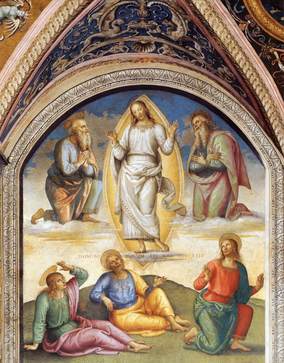 The Byzantine Catholic Church, along with the Maronite
The Byzantine Catholic Church, along with the Maronite
Church, begin the Lenten observance. The Byzantines call today Clean Monday,
the first day of the Great Fast. Maronites call today “Ash Monday.” The
Byzantine Orthodox Church will open their Lent on Monday, February 27.
the Byzantines the traditional liturgical practice is to celebrate Great
Compline, which will include the singing of a portion of the Great Canon of
Saint Andrew of Crete. Find a Melkite parish near you to celebrate
Compline tonight.
Continue reading Melkite and Maronite Churches begin Lent today
Cardinal Dolan’s church in Rome
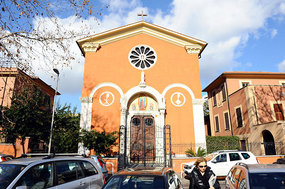 The other day I mentioned that cardinals receive a church in Rome for them to have pastoral solicitude for and to be a parish priest in the Diocese of Rome. The latter is really a fiction because the cardinal rarely has much to do his parish but this a vestige of a time when all cardinals were resident priests of Rome. Cardinal Mahoney never paid too much attention to his Roman church but Cardinal O’Malley shows up to his when he’s in Rome.
The other day I mentioned that cardinals receive a church in Rome for them to have pastoral solicitude for and to be a parish priest in the Diocese of Rome. The latter is really a fiction because the cardinal rarely has much to do his parish but this a vestige of a time when all cardinals were resident priests of Rome. Cardinal Mahoney never paid too much attention to his Roman church but Cardinal O’Malley shows up to his when he’s in Rome.
Evangelization Today : Communion and Pastoral Collaboration between Africa and Europe
The Catholic buzz word is the “evangelization.” It’s running the risk of becoming an irrelevant concept if we don’t take the time to really understand the contours of sharing the faith given to us by the Holy Spirit and authentically lived in the communion of the Church. Some bishops from Africa and Europe had a symposium to explore the needs and desires in living Christianity as an event from the 13-17 February. It didn’t get much press in these parts because (A) it is perceived that neither Africa and Europe are so far away from North America that what the symposium had to do didn’t impact us and (B), well Africa and Europe have little to say to us. Wrong. We are a communion of peoples; live our faith in communion with other Christians around the world not in isolation from the another group of people. What the Church in Africa does should, in fact, shed light on our life of faith. We belong to Christ, therefore to the Church and therefore each other; no Christian is alone.
Listen to what the Pope says here.
Fifty years after the opening of the Second Vatican Council and a few months away from the Synod on New Evangelization, we wanted to look into our hearts about this theme: Evangelization today: Communion and Pastoral Collaboration between Africa and Europe. The human person and God: the Church’s mission to proclaim God’s presence and love. In this Symposium we have found the joy of reunion, and we have assessed the progress made over these eight years. Indeed, the Beatitudes are our common treasure. More and more, they make us discover our complementary nature, but also our co-responsibility and interdependence in the lives of our local Churches. It’s a question of rising to the challenges of an increasingly new Evangelization in our two continents today “For we were all baptized by one Spirit so as to form one body ( …) and we were all given the one Spirit to drink. Even so the body is not made up of one part but of many” (1 Corinthians 12 :13-14). We have rejoiced for the progress we have made in the last decades in the relations between our two continents – the Synods for Africa and for Europe, as well as our meetings, are a testimony to this very fact.
For the full report, see The Vatican Insider
Testifying the joy of Christ’s love
“God is not isolation, but glorious and joyful love, spreading outwards and radiant with light,” Pope Benedict XVI told the assembled crowd gathered for Mass including the new cardinals. The diakonia (the service rendered) of the cardinals’ task is “to bear witness to the joy of Christ’s love.”
“Faith without love would no longer be an authentic Christian faith.”
~Pope Benedict XVI
19 February 2012
